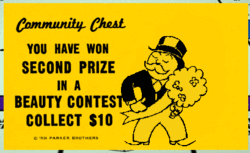
How hungry are you? (Gee, we were all so young then…)
The fact is that journalists have never been very hungry. An ad is just an empty billboard. The buyer has to fill it with a message that will drive people down the sales funnel. Traditional journalists haven’t bothered themselves with such things.
Publishers had to. A publisher’s job is to define a market – a place, an industry, a lifestyle – and bring buyers together with copy that he can then sell ads against. Publishers are businessmen. They are not subject to the “ethics” of journalists. They’re subject to the laws and the rules of business. They should be focused on market making. That is their job. For 20 years they have failed to do that job, and journalism as a whole has suffered.
Here’s how hungry you can get.

Then build two sites.
The first is a community, creating what used to be called a readership. That’s what community sites, what social sites, are about. You divide a general conversation into groups who get into specifics. You start that conversation around articles, either written by you or just linked to with a point of view. That’s Slashdot, with open source being the point of view. That’s Facebook, with you being the point of view.
Journalists know how to start building this kind of community. The publisher tells them who their readers are, and they go off looking for stories that might or should interest that reader. The stories are published, and discussion is built around those stories. All you need to do is take that discussion inside the site. Convince people that there is value in that conversation, value worth registration, with your real name, phone number, and e-mail address.

But that’s just half of what journalism must do in the digital age. You’ve got the buyers, what about the sellers? A lot of papers thought they could make do by selling ads against those stories, and that community. This proved inadequate, so they put up walls – registration walls, paywalls – and found their community resisting, drifting away.
Such a strategy is the height of stupidity. The publisher’s call on advertisers is based on the idea that she has their market. When you put up a paywall, even a registration wall, you make that promise impossible to fulfill, because you’ve rejected everyone in the target community who won’t submit to your rules. But this is the Internet. What rules exist are set by readers, by users, and not by publishers, or by sites.
So you let everyone read your stuff who wants to. You let everyone into your community who registers and agrees to conform to community norms, i.e. to netiquette. The only people you’re kicking out with your registration wall are the trolls. That’s a feature, not a bug.
Now, for the second element in a successful journalism site. Reviews.

It means eating in the restaurants, it means talking to the merchants, and doing all this with a journalist’s eye. In other words, if something is crap you say so, and if something is great you say that, too, loudly. Without fear or favor. Remember, you’re not interested in “selling ads.” You’re interested in leading your readers, your members, those people who share your home, your lifestyle, or your industry, to the “good stuff.” And you’re interested in their being more good stuff worth touting.
You don’t sell ads against this site. You build commerce.

You earn a commission. An ad is just a billboard, one that must be filled by a business. Your aim is to become that business’s salesman, their advocate, their friend. If a good business rejects your help, you limit it, but you maintain the recommendation. If a bad business seeks out your help, you start with an honest discussion of what they need to do in order to become a good business, a better business, a better value in the eyes of your community members.
You do that by sharing members’ views with this bad business. You propose solutions. You act as a consultant. You help them turn around, should they wish to turn around, and if they just listen to you politely and refuse to change, again, you walk away.
Walking away is the key here. Walk away from those who won’t do business with you, and walk away from those who won’t do it your way. Your credibility is your only asset. Playing straight with your reader, with the buyers within your market, is all you are. Never violate that trust. Don’t recommend something not worth recommending just because someone offers you money to do so.

Half of every business’ budget goes to marketing, in one way or another. Your aim is to earn as much of that budget as you can, not to sell ads but to create transactions, and to take a cut, based not on the publisher’s business rules but a journalist’s ethical rules.
Is this easy? No. Can it work? Every successful Internet business runs on this basis. You’re starting from behind – Amazon and Etsy and thousands of other national sites have been doing this kind of thing for years. But there are literally millions of businesses in this country that don’t yet have the “fire” of the Internet. You bring them that fire, you earn your commission. You earn commissions as opposed to selling ads, and you have the money to hire more consultants, and more journalists.
Wash, rinse, repeat.










